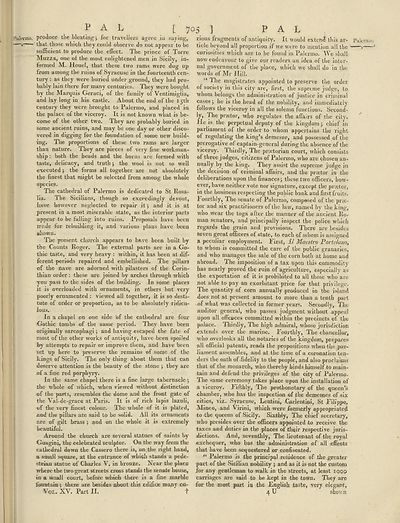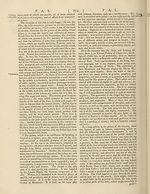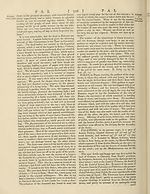Encyclopaedia Britannica > Volume 15, NIC-PAR
(781) Page 705
Download files
Complete book:
Individual page:
Thumbnail gallery: Grid view | List view

PAL
PaWmo. produce the bleating; for traveUers agree in saying,
vr— that those which they could observe do not appear to be
sufficient to produce the effect. The prince of Torre
Muzza, one oi the most enlightened men in Sicily, in¬
formed M. Houel, that these two rams were dug up
from among the ruins of Syracuse in the fourteenth cen¬
tury : as they were buried under ground, they had pro¬
bably lain there for many centuries. They were bought
by the Marquis Geraci, of the family of Ventimiglia,
and lay long in his castle. About the end of the 15th
Century they were brought to Palermo, and placed in
the palace of the viceroy. It is not known what is be¬
come of the other two. They are probably buried in
some ancient ruins, and may be one day or other disco¬
vered in digging for the foundation of some new build¬
ing. The proportions of these two rams are larger
than nature. They are pieces of very fine workman¬
ship : both the heads and the horns are formed with
taste, delicacy, and truth; the wool is not so well
executed; the forms all together are not absolutely
the finest that might be selected from among the whole
species.
The cathedral of Palermo is dedicated to St Rosa¬
lia. The Sicilians, though so exceedingly devout,
have however neglected to repair it; and it is at
present in a most miserable state, as the interior parts
appear to be falling into ruins. Proposals have been
made for rebuilding it, and various plans have been
shown.
The present church appears to have been built by
the Counts Roger. The external parts are in a Go¬
thic taste, and very heavy : within, it has been at dif¬
ferent periods repaired and embellished. The pillars
of the nave are adorned with pilasters of the Corin¬
thian order: these are joined by arches through which
you pass to the sides of the building. In some places
it is overloaded with ornaments, in others but very
poorly ornamented : viewed all together, it is so desti¬
tute of order or proportion, as to be absolutely ridicu¬
lous.
In a chapel on one side of the cathedral are four
Gothic tombs of the same period. They have been
originally sarcophagi; and having escaped the fate of
most of the other works of antiquity, have been spoiled
by attempts to repair or improve them, and have been
set up here to preserve the remains of some of the
kings of Sicily. The only thing about them that can
deserve attention is the beauty of the stone ; they are
of a fine red porphyry.
In the same chapel there is a fine large tabernacle ;
the whole of which, when viewed without distinction
©f the parts, resembles the dome and the front gate of
the Val-de-graee at Paris. It is of rich lapis lazuli,
of the very finest colour. The whole of it is plated,
and the pillars are said to be solid. All its ornaments
are of gilt brass ; and on the whole it is extremely
beautiful.
Around the church are several statues of saints by
Guaginj, the celebrated sculptor. On the way from the
cathedral down the Cassero there is, on, the right hand,
a small square, at the entrance of which stands a pede¬
strian statue of Charles V. in bronze. Near the place
where the two great streets cross stands the senate house,
in a small court, before which there is a fine marble
fountain; there are besides about this edifice many cu-
Vol. XV. Part II. ' t
1 7°5 1
PAL
rious fragments of antiquity. It would extend this ar¬
ticle beyond all proportion if we were to mention all the ^
curiosities which are to be found in Palermo. We shall
nowr endeavour to give our readers an idea of the inter¬
nal government ol the place, which we shall do in the
words of Mr Hill.
u J he magistrates appointed to preserve the order
of society in tins city are, first, the supreme judge, to
whom belongs the administration of justice in criminal
cases; he is the head of the nobility, and immediately
follows the viceroy in all the solemn functions. Second¬
ly, The prsetor, who regulates the affairs of the city.
He is the perpetual deputy of the kingdom; chief in
parliament of the order to whom appertains the right
of regulating the king’s demesne, and possessed of the
prerogative of captain-general during the absence of the
viceroy. Ihirdly, The praetorian court, which consists
of three judges, citizens of Palermo, who are chosen an¬
nually by the king. They assist the supreme judge in
the decision of criminal affairs, and the praetor in the
deliberations upon the finances; these two officers, how¬
ever, have neither vote nor signature, except the praetor,
in the business respecting the public bank and first fruits,
fourthly, The senate of Palermo, composed of the prae¬
tor and six practitioners of the law, named by the king,
who wear the toga after the manner of the ancient Ro¬
man senators, and principally inspect the police which
regards the grain and provisions. There are besides
seven great officers of state, to each of whom is assigned
a peculiar employment. First, II Maestro Portclano,
to whom is committed the care of the public granaries,
and who manages the sale of the corn both at home and
abroad. Ihe imposition of a tax upon this commodity
has nearly proved the ruin of agriculture, especially as
the exportation of it is prohibited to all those who arc
not able to pay an exorbitant price for that privilege.
The quantity of corn annually produced in the island
does not at present amount to more than a tenth part
of what was collected in former years. Secondly, The
auditor general, who passes judgment without appeal
upon all offeuces committed within the precincts of the
palace. Thirdly, The high admiral, whose jurisdiction
extends over the marine. Fourthly, The chancellor,
who overlooks all the notaries of the kingdom, prepares
all official patents, reads the propositions when the par¬
liament assembles, and at the time of a coronation ten¬
ders the oath of fidelity to the people, and also proclaims
that of the monarch, who thereby binds himself to main¬
tain and defend the privileges of the city of Palermo.
The same ceremony takes place upon the installation of
a viceroy. Fifthly, The prothonotary of the queen’s
chamber, who has the inspection of jthe demesnes of six
cities, viz. Syracuse, Lentini, Qirlentini, St Filippo,
Mineo, and Virini, which were formerly appropriated
to the queens of Sicily. Sixthly, The chief secretary,
who presides over the officers appointed to receive the
taxes and duties in the places of their respective juris¬
dictions. And, seventhly, The lieutenant of the. royal
exchequer, who has the administration of all effects
that have been sequestered or confiscated.
“ Palermo is the principal residence of the greater
part of the Sicilian nobility ; and as it is not the custom
for any gentleman to walk in the streets, at least 1000
carriages are said to be kept in the town. They are
for the most part ia the English taste, very elegant,
4 U shown
Palermo.
PaWmo. produce the bleating; for traveUers agree in saying,
vr— that those which they could observe do not appear to be
sufficient to produce the effect. The prince of Torre
Muzza, one oi the most enlightened men in Sicily, in¬
formed M. Houel, that these two rams were dug up
from among the ruins of Syracuse in the fourteenth cen¬
tury : as they were buried under ground, they had pro¬
bably lain there for many centuries. They were bought
by the Marquis Geraci, of the family of Ventimiglia,
and lay long in his castle. About the end of the 15th
Century they were brought to Palermo, and placed in
the palace of the viceroy. It is not known what is be¬
come of the other two. They are probably buried in
some ancient ruins, and may be one day or other disco¬
vered in digging for the foundation of some new build¬
ing. The proportions of these two rams are larger
than nature. They are pieces of very fine workman¬
ship : both the heads and the horns are formed with
taste, delicacy, and truth; the wool is not so well
executed; the forms all together are not absolutely
the finest that might be selected from among the whole
species.
The cathedral of Palermo is dedicated to St Rosa¬
lia. The Sicilians, though so exceedingly devout,
have however neglected to repair it; and it is at
present in a most miserable state, as the interior parts
appear to be falling into ruins. Proposals have been
made for rebuilding it, and various plans have been
shown.
The present church appears to have been built by
the Counts Roger. The external parts are in a Go¬
thic taste, and very heavy : within, it has been at dif¬
ferent periods repaired and embellished. The pillars
of the nave are adorned with pilasters of the Corin¬
thian order: these are joined by arches through which
you pass to the sides of the building. In some places
it is overloaded with ornaments, in others but very
poorly ornamented : viewed all together, it is so desti¬
tute of order or proportion, as to be absolutely ridicu¬
lous.
In a chapel on one side of the cathedral are four
Gothic tombs of the same period. They have been
originally sarcophagi; and having escaped the fate of
most of the other works of antiquity, have been spoiled
by attempts to repair or improve them, and have been
set up here to preserve the remains of some of the
kings of Sicily. The only thing about them that can
deserve attention is the beauty of the stone ; they are
of a fine red porphyry.
In the same chapel there is a fine large tabernacle ;
the whole of which, when viewed without distinction
©f the parts, resembles the dome and the front gate of
the Val-de-graee at Paris. It is of rich lapis lazuli,
of the very finest colour. The whole of it is plated,
and the pillars are said to be solid. All its ornaments
are of gilt brass ; and on the whole it is extremely
beautiful.
Around the church are several statues of saints by
Guaginj, the celebrated sculptor. On the way from the
cathedral down the Cassero there is, on, the right hand,
a small square, at the entrance of which stands a pede¬
strian statue of Charles V. in bronze. Near the place
where the two great streets cross stands the senate house,
in a small court, before which there is a fine marble
fountain; there are besides about this edifice many cu-
Vol. XV. Part II. ' t
1 7°5 1
PAL
rious fragments of antiquity. It would extend this ar¬
ticle beyond all proportion if we were to mention all the ^
curiosities which are to be found in Palermo. We shall
nowr endeavour to give our readers an idea of the inter¬
nal government ol the place, which we shall do in the
words of Mr Hill.
u J he magistrates appointed to preserve the order
of society in tins city are, first, the supreme judge, to
whom belongs the administration of justice in criminal
cases; he is the head of the nobility, and immediately
follows the viceroy in all the solemn functions. Second¬
ly, The prsetor, who regulates the affairs of the city.
He is the perpetual deputy of the kingdom; chief in
parliament of the order to whom appertains the right
of regulating the king’s demesne, and possessed of the
prerogative of captain-general during the absence of the
viceroy. Ihirdly, The praetorian court, which consists
of three judges, citizens of Palermo, who are chosen an¬
nually by the king. They assist the supreme judge in
the decision of criminal affairs, and the praetor in the
deliberations upon the finances; these two officers, how¬
ever, have neither vote nor signature, except the praetor,
in the business respecting the public bank and first fruits,
fourthly, The senate of Palermo, composed of the prae¬
tor and six practitioners of the law, named by the king,
who wear the toga after the manner of the ancient Ro¬
man senators, and principally inspect the police which
regards the grain and provisions. There are besides
seven great officers of state, to each of whom is assigned
a peculiar employment. First, II Maestro Portclano,
to whom is committed the care of the public granaries,
and who manages the sale of the corn both at home and
abroad. Ihe imposition of a tax upon this commodity
has nearly proved the ruin of agriculture, especially as
the exportation of it is prohibited to all those who arc
not able to pay an exorbitant price for that privilege.
The quantity of corn annually produced in the island
does not at present amount to more than a tenth part
of what was collected in former years. Secondly, The
auditor general, who passes judgment without appeal
upon all offeuces committed within the precincts of the
palace. Thirdly, The high admiral, whose jurisdiction
extends over the marine. Fourthly, The chancellor,
who overlooks all the notaries of the kingdom, prepares
all official patents, reads the propositions when the par¬
liament assembles, and at the time of a coronation ten¬
ders the oath of fidelity to the people, and also proclaims
that of the monarch, who thereby binds himself to main¬
tain and defend the privileges of the city of Palermo.
The same ceremony takes place upon the installation of
a viceroy. Fifthly, The prothonotary of the queen’s
chamber, who has the inspection of jthe demesnes of six
cities, viz. Syracuse, Lentini, Qirlentini, St Filippo,
Mineo, and Virini, which were formerly appropriated
to the queens of Sicily. Sixthly, The chief secretary,
who presides over the officers appointed to receive the
taxes and duties in the places of their respective juris¬
dictions. And, seventhly, The lieutenant of the. royal
exchequer, who has the administration of all effects
that have been sequestered or confiscated.
“ Palermo is the principal residence of the greater
part of the Sicilian nobility ; and as it is not the custom
for any gentleman to walk in the streets, at least 1000
carriages are said to be kept in the town. They are
for the most part ia the English taste, very elegant,
4 U shown
Palermo.
Set display mode to:
![]() Universal Viewer |
Universal Viewer | ![]() Mirador |
Large image | Transcription
Mirador |
Large image | Transcription
Images and transcriptions on this page, including medium image downloads, may be used under the Creative Commons Attribution 4.0 International Licence unless otherwise stated. ![]()
| Encyclopaedia Britannica > Encyclopaedia Britannica > Volume 15, NIC-PAR > (781) Page 705 |
|---|
| Permanent URL | https://digital.nls.uk/192591851 |
|---|
| Attribution and copyright: |
|
|---|
| Shelfmark | EB.11 |
|---|---|
| Description | Ten editions of 'Encyclopaedia Britannica', issued from 1768-1903, in 231 volumes. Originally issued in 100 weekly parts (3 volumes) between 1768 and 1771 by publishers: Colin Macfarquhar and Andrew Bell (Edinburgh); editor: William Smellie: engraver: Andrew Bell. Expanded editions in the 19th century featured more volumes and contributions from leading experts in their fields. Managed and published in Edinburgh up to the 9th edition (25 volumes, from 1875-1889); the 10th edition (1902-1903) re-issued the 9th edition, with 11 supplementary volumes. |
|---|---|
| Additional NLS resources: |
|

